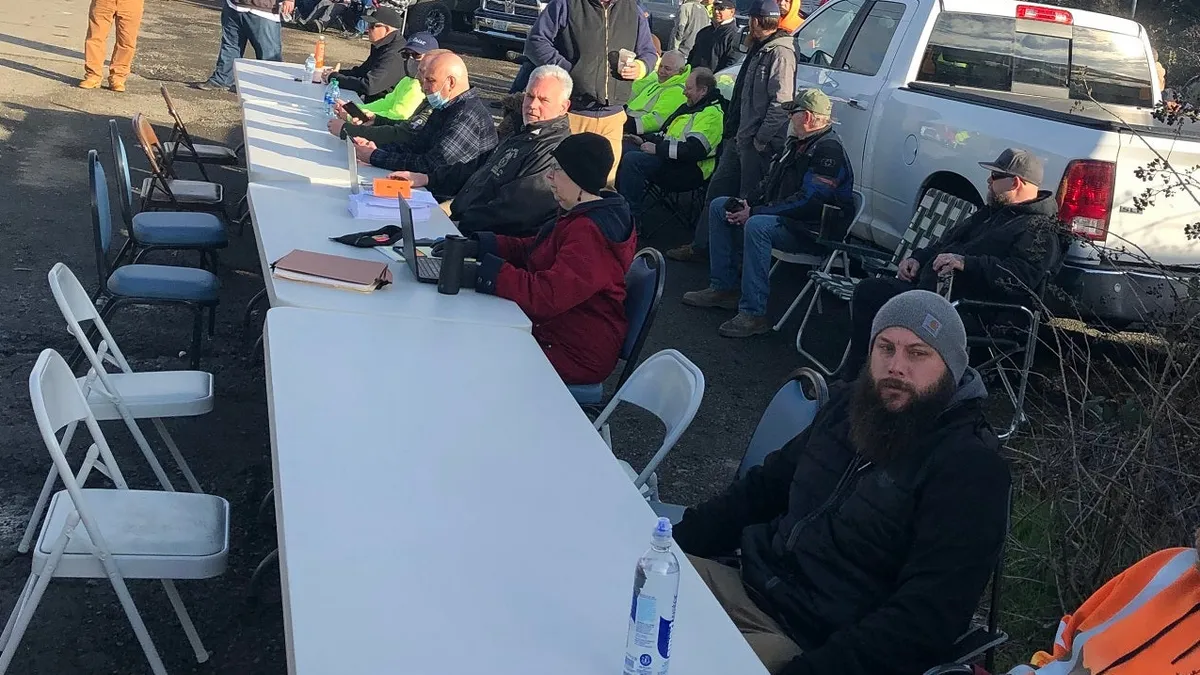Dive Brief:
- A group of contractors in the Seattle area is calling for an end to the Teamsters strike that is hamstringing the flow of concrete to jobsites and could delay area projects, according to a press release from Turner Construction. The group includes eight general contractors, five developers and more than 20 subcontractors including Skanska, JTM Construction and Sellen Construction.
- The cement mixer truck driver and plant employee strike, first launched by Teamsters Local 174 on Nov. 19 with 34 workers, has grown to over 300 workers and affects six different concrete companies. The workers are seeking higher wages and better healthcare benefits for recently retired members.
- Local officials are pushing hard to halt the strike as well. King County officials just released a Request For Qualifications (RFQ) worth more than $30 million seeking a concrete company with unionized workers to supply county projects for at least three years, according to the Seattle Times, which obtained a copy of the contract. Some in the industry think the offer is meant to drive a wedge between the striking companies, the Times said.
Dive Insight:
In addition to the group of contractors and developers, local officials also are pushing for the Teamsters and the concrete companies to return to the negotiating table, citing a threat of more than 15,000 layoffs across several industries. Those at risk of being laid off include not just the 300-plus striking workers, but related tradespeople from industries including masonry, structural steel, roofing and more who cannot work because of the strike's impact on active projects, according to the statement.
"We respect the right of the parties to bargain," said Turner Construction's general manager, Bill Ketcham, in the Feb. 9 statement. "But the standstill has now shut down dozens of public and private construction projects and thrown thousands of people out of work at a time when the pandemic has already ravaged our economy. People need to get back to work now, while negotiations continue in earnest."
Some current projects are facing delays due to the strike. The West Seattle Bridge, originally scheduled to be completed in mid-2022, will be delayed if the strike extends past Feb. 20, according to a press release from Seattle mayor Bruce Harrell. Other jobs that could be hampered by the strike are the Waterfront Seattle Program, Madison RapidRide G Line and the Ship Canal Water Quality Project, according to the mayor's office.
With these delays in mind, local officials are hoping that measures such as the King County RFQ, which promises a constant supply of concrete to the county, will bring both parties back to the table. King County Executive Dow Constantine, who announced the contract on Feb. 9, was hopeful that it would drive negotiations forward, and tempt one of the concrete companies to break ranks or end the strike. The Teamsters praised news of the RFQ.
"My sincere hope is that by having the opportunity to really secure the business for themselves — $30 million over the course of next three years, much more in the future — that they will understand that there are larger issues and really more money at stake than what's represented in the relatively minor differences between the Teamsters and concrete companies in this negotiation," Constantine told the Seattle Times.
On Feb. 9, the Teamsters staged a negotiating table, pictured above, in front of Gary Merlino Construction headquarters, which the union said signaled that they were ready to negotiate for the end of the strike. The concrete companies say they are also ready to return to the negotiating table, but called the Teamster proceedings "antics."
"Enough with the political and media grandstanding. It is time for serious effort," said four of the companies in a statement.














